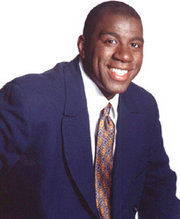

Earvin "Magic" Johnson, Jr. (born August 14, 1959 in Lansing,
Michigan) is a 6' 9" former American professional basketball star
who played for the Los Angeles Lakers during the 1980s and early 1990s.
Playing point guard, he led the Lakers to five NBA championships (1980,
1982, 1985, 1987 and 1988), as well as four other NBA Finals appearances.
He also led Michigan State University to the NCAA title in 1979 against
arch-rival Larry Bird's Indiana State University. Johnson is also the
only NBA rookie to win the NBA Finals MVP Award. He is one of only
four players to win NCAA and NBA championships in consecutive years.
Johnson earned the nickname "Magic" at Everett High School
from a local sports writer, both for his flamboyant passing style and
winning ways. While not known as an exceptional scorer, Magic excelled
in all other facets of the game. In different periods of his career,
he led the league in assists and steals. He led the Lakers in scoring
three times (1987, 1989, 1990) and in rebounding twice (1982, 1983).
Although he and Bird eventually became the best of friends off the
court, they revived the heated Lakers-Celtics Rivalry and drew millions
of new fans to the NBA.
The greatest game of Johnson's career arguably came in his rookie season: May 16, 1980, in Game 6 of the NBA Finals at Philadelphia. Filling in for the injured Kareem Abdul-Jabbar, Magic started the game at center and eventually played every position on the floor in a dominating performance. Scoring a game-high 42 points and grabbing a game-high 15 rebounds, he led the Lakers to the NBA crown, stunning Julius Erving, the Philadelphia 76ers, and a national television audience who came to understand the moniker "Magic". Johnson went on to lead the Lakers to championships in 1982, 1985, 1987 and 1988.
Earvin "Magic" Johnson, Jr. (born August 14, 1959 in Lansing, Michigan) is a 6' 9" former American professional basketball star who played for the Los Angeles Lakers during the 1980s and early 1990s. Playing point guard, he led the Lakers to five NBA championships (1980, 1982, 1985, 1987 and 1988), as well as four other NBA Finals appearances. He also led Michigan State University to the NCAA title in 1979 against arch-rival Larry Bird's Indiana State University. Johnson is also the only NBA rookie to win the NBA Finals MVP Award. He is one of only four players to win NCAA and NBA championships in consecutive years.Johnson earned the nickname "Magic" at Everett High School from a local sports writer, both for his flamboyant passing style and winning ways. While not known as an exceptional scorer, Magic excelled in all other facets of the game. In different periods of his career, he led the league in assists and steals. He led the Lakers in scoring three times (1987, 1989, 1990) and in rebounding twice (1982, 1983). Although he and Bird eventually became the best of friends off the court, they revived the heated Lakers-Celtics Rivalry and drew millions of new fans to the NBA.
The greatest game of Johnson's career arguably came in his rookie season:
May 16, 1980, in Game 6 of the NBA Finals at Philadelphia. Filling in for
the injured Kareem Abdul-Jabbar, Magic started the game at center and eventually
played every position on the floor in a dominating performance. Scoring
a game-high 42 points and grabbing a game-high 15 rebounds, he led the
Lakers to the NBA crown, stunning Julius Erving, the Philadelphia 76ers,
and a national television audience who came to understand the moniker "Magic".
Johnson went on to lead the Lakers to championships in 1982, 1985, 1987
and 1988.
On the court
Johnson possessed stellar point guard talent. His unselfish playmaking
and dazzling no-look passes on the fast break ushered in the "Showtime" era
of Laker basketball, which dominated the eighties. He is widely considered
to be one of the most exciting playmakers of the NBA, maybe the best of
all time. At 6' 9", a size normally reserved for power forwards, Johnson
was also easily one of the largest point guards ever to play on NBA level.
He revolutionised the concept of the "oversized point guard",
able to post up and outmuscle his much smaller opposition. His stature,
paired with his talent, allowed him to play virtually every position from
center to point guard.
Magic is - statistically seen - probably the greatest offensive producer
ever. Assuming every assist creates 2 points, Magic created 54.85 points
per 48 minutes, compared to Michael Jordan's 50.98 or Wilt Chamberlain's
40.82.
HIV publicity
Outside of basketball, Johnson is probably most famous for his November
7, 1991, public announcement that he had contracted HIV and would be immediately
retiring from basketball. The public announcement by a prominent and popular
athlete shocked the nation into awareness about the AIDS epidemic and helped
put the virus into the public eye.
Johnson and a team of ghostwriters produced a book which was published by Random House in 1992. Profits from the book were donated to the Magic Johnson Foundation for the prevention, education, research and care in the battle against AIDS.
Other ventures
His post-basketball business ventures include Magic Johnson Theatres, a
nationwide chain of movie theaters whose complexes are primarily in urban
locations. The chain is now a part of Loews Theatres, but is operated as
a separate entity. More recently, his interests have expanded from a shortlived
1998 talk show "The Magic Hour", to ownership of several Starbucks
franchises, again primarily in urban locations. Johnson is believed to
have earned significantly more money from post-basketball ventures than
from his playing days and endorsement deals.
Johnson also works as an NBA studio analyst for TNT.
Johnson was ranked #5 in SLAM Magazine's Top 75 NBA Players of all time in 2003.
This biography is courtesy of Wikipedia, the free encyclopedia